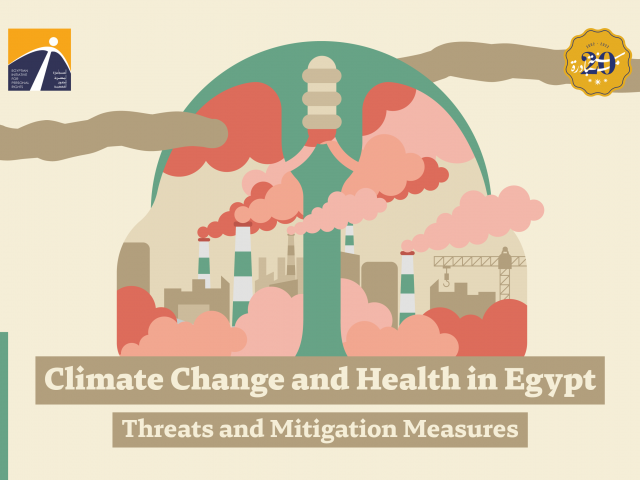
EIPR publishes a new research paper on health and climate change in Egypt
Press Release
Today, EIPR released a research paper entitled "Climate Change and Health in Egypt--Threats and Mitigation Measures". The paper, which is issued within the "Environmental Papers" series, addresses the intersection between public health and environmental policies in Egypt, coinciding with Egypt's hosting of the twenty-seventh session of the Conference of the Parties to the United Nations Climate Agreement (COP27) next month in Sharm El-Sheikh.
Climate change is considered the largest global health disaster, according to the World Health Organization (WHO). It causes physical or mental illness, as well as an increase in zoonotic and transmitted diseases, whether through food, water or insects. Climate change is expected to cause 250,000 deaths worldwide, with direct health losses to reach between $2-4 billion annually, as of 2030.
It is now well established that existing health threats will intensify and new health threats will emerge as a result of climate change. Therefore, the WHO called on all countries at the climate conference in Glasgow last year (COP26) to prepare to confront these health risks, stressing the need to listen to and support healthy communities, and to develop the health sector’s capabilities to withstand climate risks, in addition to other recommendations to reduce greenhouse gas emissions and air pollutants.
EIPR’s new paper focuses on the potential health burdens of climate change in Egypt. It reviews government preparations in the health sector set out in the Climate Change Strategy 2050 and the updated Nationally Determined Contributions (NDCs) issued this year, as the reference for local climate action. The paper also provides an analysis of current government plans, and an assessment of environmental health programs.
The paper analyzes regulatory gaps by reviewing WHO assessments of the Egyptian health sector, in addition to local and international reports, in an attempt to assess gaps in the health sector's preparedness for potential climate change risks.
It also outlines many opportunities available to improve environmental policies affecting the health sector, and recommends that the Egyptian government deepen the discussions held to launch the climate change strategy 2050, and integrate health programs with specific costs into climate change plans.
Finally, this paper also recommends obligating investors to conduct health impact assessments (HIA) for industrial and service projects, as well as environmental impact studies. It recommends imposing taxes on noise, emissions, wastewater, or polluted waste in Egypt, and directing the revenues to support the health sector.



